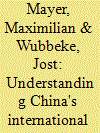| Srl | Item |
| 1 |
ID:
123723


|
|
|
|
|
| Publication |
2013.
|
| Summary/Abstract |
Since China joined the international climate negotiations, the role of systematic research and expert advice has grown steadily. A small but highly specialized expert community of semi-official research institutes and university-based research units has formed around Chinese policy-making institutions. The findings of this article indicate that these climate experts have become important actors in Chinese climate policy. Political leaders frequently consult members of this expert community and draw on their substantive conclusions. In some cases, experts have been able to influence policy action by raising awareness of climate vulnerability and contributing to the definition of national emission targets. However, experts seeking to alter the general framework of 'common but different responsibilities' have had limited impact.
|
|
|
|
|
|
|
|
|
|
|
|
|
|
|
|
| 2 |
ID:
123758


|
|
|
|
|
| Publication |
2013.
|
| Summary/Abstract |
Focusing on the relationship between oil imports and China's compromising and business-like attitude, this article shows that empirical observations do not support several commonplace assumptions that China's growing oil dependence leads to conflict scenarios. The non-escalating nature of the Chinese energy policy constitutes an intriguing puzzle. Although the country currently relies on foreign oil for more than half of its consumption, it does not possess a single overseas base, has not employed troops to secure oil supplies, and strongly relies on world markets to satisfy the growing energy demand. Instead, the main components of the Chinese policy are based on pragmatism fostering integration into existing supply systems and market institutions. This analysis, in turn, points to the importance of structural conditions within global energy politics on the one hand, and pragmatist behaviour on the other, rather than internal motivations or strategic intentions, in order to understand the evolution of China's energy policies. Finally, we briefly discuss the possibility of a reverse dynamic-possibly emerging due to a changing regional or global environment.
|
|
|
|
|
|
|
|
|
|
|
|
|
|
|
|